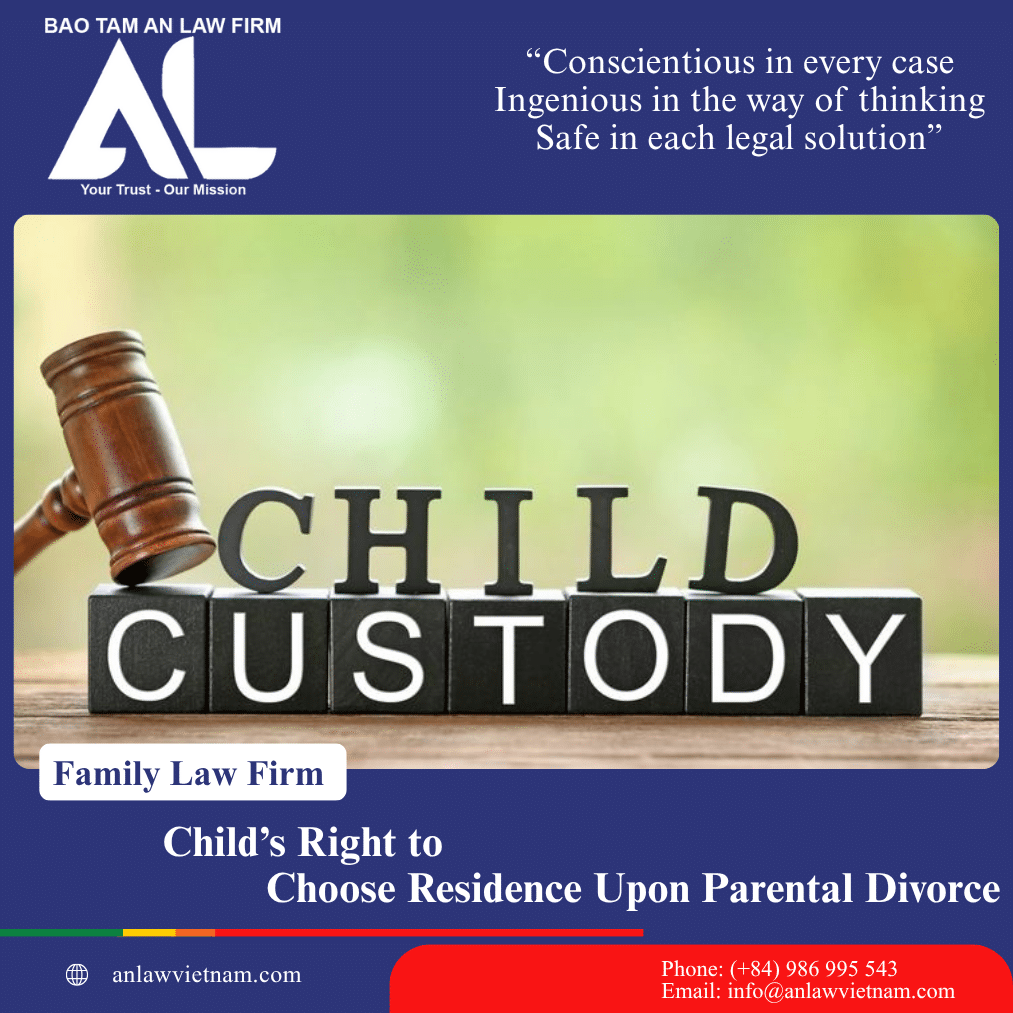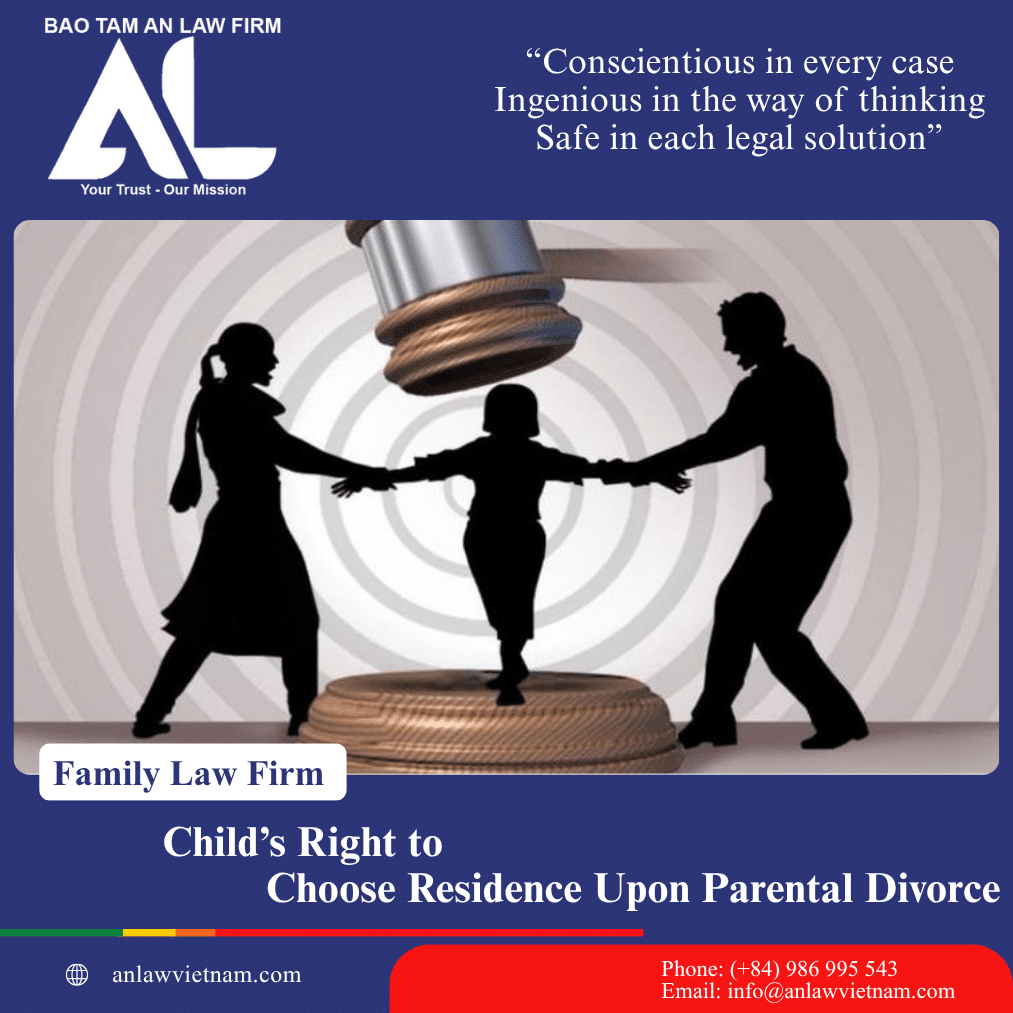Child’s Right to Choose Residence Upon Parental Divorce
The 7-Year Statutory Threshold and Resolving Custody Disputes
Does a 15-Year-Old Child Have the LEGAL Right to Refuse Living with Their Mother (or Father) Upon Divorce?
When parents separate or divorce, one of the most difficult and emotional decisions concerns child custody and maintenance.
You are 15 years old and wish to live with your father because the relationship with your mother is strained. Do you have the right to choose?
Your situation addresses the core of the “Child’s Right to Choose Residence” under Vietnamese law. While every parent desires what is best for their child, “the best interest” is rigidly defined by the Court based on established legal criteria.
The Court aims to balance the protection of the child with ensuring both parents fulfill their responsibilities. Particularly in cases involving statutory age limits, foreign spouses, or financial stability, understanding the Court’s decisive criteria is your sole strategy for protecting your rights in a custody dispute.
This article will analyze the core principle of “The Best Interests of the Child,” the legal age thresholds, and how the Court takes the opinion of minors into account to resolve disputes.
Quick Answers: The Child’s Right to Choose Residence
Child custody and maintenance in Vietnam are governed by the Law on Marriage and Family 2014. Following divorce, parents are encouraged to reach a mutual agreement. If an agreement cannot be reached, the Court will intervene.
Below are direct answers to the most common legal questions in custody disputes, compiled based on the experience of Family Law Firm – An Law Vietnam:
Legal Issue | Direct Answer |
Does a child in Vietnam have the right to unilaterally decide who they live with? | NO absolute right. A child aged 7 or older will have their wishes considered by the Court, but the final decision is based on “The Best Interests of the Child.” |
What are the most crucial statutory age thresholds? | The most crucial legal thresholds are 7 years old (mandatory consideration of wishes) and 36 months old (prioritization of the mother for custody). |
Can a child live with grandparents/relatives? | YES, if the Court determines that both parents are unfit to directly raise the child. The Court will assign the child to a legal guardian (often grandparents, per the Civil Code 2015). |
Can a minor (15 years old) refuse to live with a parent? | A 15-year-old’s opinion carries more weight but is not absolute. The Court will evaluate whether that opinion serves the child’s long-term interests. |
The “Best Interests” Principle and the 7-Year Statutory Threshold
Vietnamese law does not grant a child the absolute right to unilaterally choose which parent they live with. Instead, the decision is based on the principle of “The Best Interests of the Child” (Article 81, Law on Marriage and Family 2014).
Right to Choose by Statute (The 7-Year Threshold)
According to Clause 2, Article 81 of the Law on Marriage and Family 2014: “If the child is aged 07 years or older, the child’s wishes must be considered.”
- Under 7 years old: The child’s opinion is not mandatory to consider.
- 7 years old or older: The child’s opinion is a mandatory legal basis that the Judge must consider and document in the case file, but it does not have binding decisive value.
Statutory Prioritization (The 36-Month Threshold)
A child under 36 months old is typically assigned to the mother for direct custody, unless the mother is unfit or there is a contrary agreement (Clause 3, Article 81). This regulation aims to ensure optimal physical and emotional care for infants.
5 Factors Considered by the Court (Defining the Best Interests)
When evaluating the child’s wishes and issuing a custody ruling, the Court focuses on the following criteria:
- Child’s Maturity and Health Status: The child’s age, emotional maturity level, and health condition.
- Financial Capacity and Stable Living Environment: The ability of each parent to provide a stable, loving living environment, economic resources, and educational opportunities.
- Current Relationship Between Child and Parent: The stability, consistency, and actual history of care the child shares with each parent.
- Parental Conduct and Morality: Any history of domestic violence, abuse, or parental neglect in the child’s care.
- Child’s Wishes (Aged 7 or older): The Court assesses whether the child’s wish stems from genuine will, understanding, or is influenced by undue pressure from either party.
Procedures for Eliciting Wishes and the Weight of Choice in Adolescence
How Does the Court Elicit the Child’s Wishes?
The Court typically elicits the child’s wishes through a private interview, conducted by the Judge or a court-appointed psychological expert.
- The interview is conducted without the presence of either parent to avoid pressure or influence from any party.
- The Court seeks to determine if the child was coached, if the wish stems from genuine affection or material factors, and the child’s general emotional state.
Weight of Choice in Adolescence
Although the law sets the 7-year threshold, for children in adolescence (such as the 15-year-old in the above scenario), their opinion often carries greater weight.
- The Court acknowledges that adolescents have a clearer self-awareness and are more capable of expressing their thoughts and desires rationally, understanding the consequences of their decisions.
- However, the Court will not automatically accept a refusal if it does not serve the child’s long-term interests (e.g., the chosen parent has an unhealthy lifestyle or cannot guarantee educational stability).
Resolving Disputes: Contested Custody and Co-Parenting
When Both Parents Seek Sole Custody
The Court will conduct a comprehensive evaluation of each parent’s ability to meet the child’s needs, including: living conditions, actual care capacity, psychological impact, and the level of cooperation/conflict between the parents.
Custody will be awarded to the parent who can best guarantee the child’s life, stability, and happiness.
Cases Where the Child May Live with Grandparents (Guardian)
According to Clause 4, Article 84 of the Law on Marriage and Family 2014, if the Court determines that both parents are unfit to directly raise the child, the Court will assign the child to a legal guardian as stipulated by the Civil Code.
In such cases, the paternal and maternal grandparents are the natural guardians prioritized under the law.
Modification of Orders and the Importance of Specialist Legal Counsel
Modification of Orders: Grounds Accepted by the Court
Vietnamese law allows for the modification of a custody order if the factual circumstances have undergone a significant change (Article 84, Law on M&F). Common grounds include:
- One parent is no longer fit to care for the child (e.g., loss of job, serious illness).
- The child’s needs and circumstances change with age or developmental stage.
- The child expresses a strong and sustained desire to live with the other parent (especially children aged 7 or older).

Conclusion: The Vital Role of Specialist Legal Counsel and Service Commitment
Experience: A Resilient Legal Shield
Child custody disputes are among the most complex legal matters. Whether your agreement is amicable or highly contested, especially when involving cross-border factors or assets, the specialist experience of the attorneys at Family Law Firm – An Law Vietnam is the key factor, acting as a legal shield to ensure your rights and obligations are absolutely protected, with evidence prepared most persuasively before the Court.
Understanding: Strategy for the Child’s Future
At Family Law Firm – An Law Vietnam, we understand that gaining custody is not merely a legal suit; it is a battle for your child’s future and stability. We approach every case with strategic clarity and the necessary diligence, committed to achieving the outcome of “The Best Interests of the Child.”
Empathy: Support Through Emotional Pressure
We deeply empathize with the immense anxiety and emotional pressure you and your family are enduring. We are committed not only to serving as your legal representative but also as a dedicated companion, ensuring the proceedings run smoothly, minimizing stress and negative emotions.
Action: Secure Your Child’s Future Now
Do not let legal and emotional pressures compromise your child’s future and stability. Take immediate action today to safeguard their legal rights and interests.
Appreciation: Our Final Pledge
Allow Family Law Firm – An Law Vietnam to appreciatively shoulder the legal responsibility and safeguard your family’s future.
To receive expert consultation and build the most optimal legal strategy regarding child custody arrangements in Vietnam, please contact us today:
Contact Us
📞 Phone: (+84) 986 995 543
📧 Email: info@anlawvietnam.com
📍 Head Office: Diamond Plaza, 34 Le Duan Street, Sai Gon Ward, Ho Chi Minh City
🏢 Vung Tau Branch: Vo Thi Sau Street, Vung Tau Ward, Ho Chi Minh City
Related Articles:
Best Child Custody in Vietnam: 5 Factors That Determine the Decision
High Net Worth (HNW) Divorce: 3 Golden Principles, Procedures for Dividing Businesses & Foreign Assets
Divorce Services For Foreign Nationals In Vietnam
Divorce – Unilateral Divorce – Property Division, Child Custody Rights
The Cost of Divorce with a Foreign Element in Vietnam: A Detailed Guide to Avoiding Unexpected Expenses
Does Vietnam Allow Dual Citizenship? 4 Crucial Exceptions You Need to Know
Reacquisition of Vietnamese Nationality: 6 Mandatory Conditions for Overseas Vietnamese and the Option for Dual Citizenship (2025 Update)
Overseas Vietnamese Inheritance Disputes (Việt Kiều) – Procedures for Estate Declaration, Land Use Right Certificates & Legal Solutions
Child’s Right to Choose Residence Upon Parental Divorce: The 7-Year Statutory Threshold and Resolving Custody Disputes
